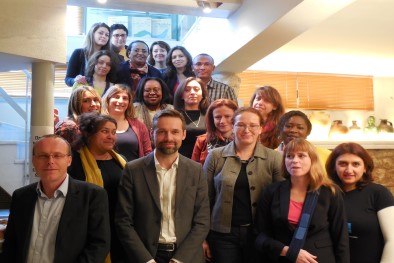With a diverse group of participants - from the GWP Secretariat in Stockholm and various GWP regional partnerships to GWP-Med partners and collaborators, such as the Swedish International Development Cooperation Agency and the Swedish International Water Institute - the workshop benefited from a mixed set of backgrounds which enormously contributed to a fruitful exchange of views. Participants’ main interest focused on exploring conceptual methods and practical tools to horizontally incorporate gender and CSR in their line of work, as well as to come up with strong arguments on the added value of streamlining both themes throughout their water related policy work.
Starting with CSR, presentations focused on the basic concepts and models and the private sector’s motivation with regards to CSR. Group work focused on engaging the private sector in CSR related to water as well as GWP’s potential contribution towards this direction. The gender aspect followed with presentations focusing on the difference between gender and sex, stressing the gender’s intersectionality when it comes to mainstreaming.
Following the basic concepts, participants were introduced to the methodology, analysis and tools for integrating CSR and gender issues into all aspects of work. There was a strong demand for concrete examples of mainstreaming these cross-cutting issues from designing a project up to its implementation. Key CSR and gender analysis concepts were addressed, along their relevance to the project results, through a mix methodology of presentations, plenary discussions and group work based on participatory methodologies. Hands-on exercises were based on actual work cases, such as the recently launched GWP Gender Strategy and the methodology applied in the National Policy Dialogues conducted within the ‘Governance & Financing for the Mediterranean Water Sector’ project and focused on identifying opportunities and challenges for mainstreaming related issues into water policy related work.
During the workshop, tools were provided to build participants’ capacity on conducting analysis at different levels; from strategic and project design to operational levels and on using these tools in consultation processes and policy making, while the benefits and impact of integrating gender and CSR at all levels were meaningfully addressed.
Participants left the workshop with an enhanced understanding of gender and CSR modalities, fully aware of the added value that these can bring to their work and equipped with some practical tools for incorporating them into their work. The workshop was described as an “eye opener” for the variety of perceptions and concepts provided and analysed, as well as a “stepping stone” that -with further efforts- can lead towards enhanced projects results.
The workshop was held in the framework of the ‘Governance & Financing for the Mediterranean Water Sector’ Project, labelled under the Union for the Mediterranean and implemented by GWP-Med and the OECD. Aiming to diagnose key governance bottlenecks to mobilising financing for the Mediterranean water sector and to support the development of consensual action plans based on international good practices, the project views transparency, accountability and participation as cornerstones to more sustainable governance structures and an enabling business environment contributing to the water sector’s financial sustainability.
The Project is financially supported by Sida, under its MENA Regional Strategy that aims to tackle cross-cutting issues such as gender, human rights, equity and poverty through all supported development projects. With GWP recently having launched its Gender Strategy, currently being regionally adapted, the workshop was an excellent opportunity for GWP and Sida to join forces and strengthen their mutual efforts in mainstreaming gender into the work undertaken within the water policy projects, as well as to elaborate on the role of private sector contribution in water governance and the related horizontal issues.
